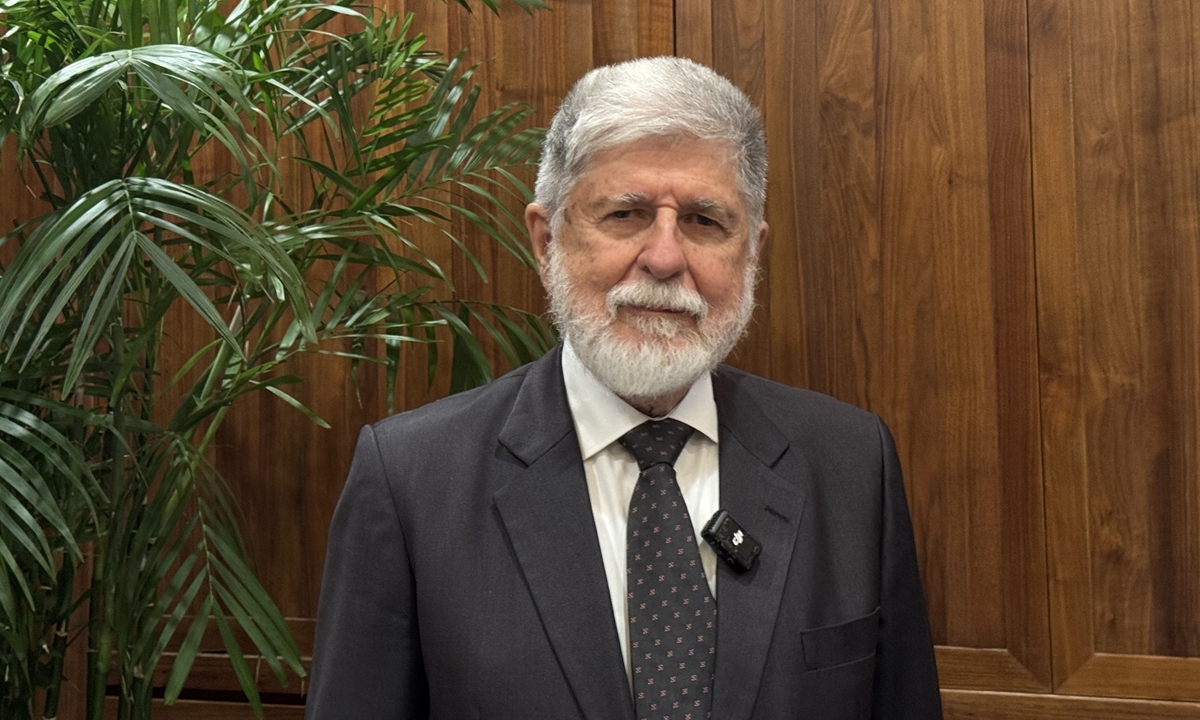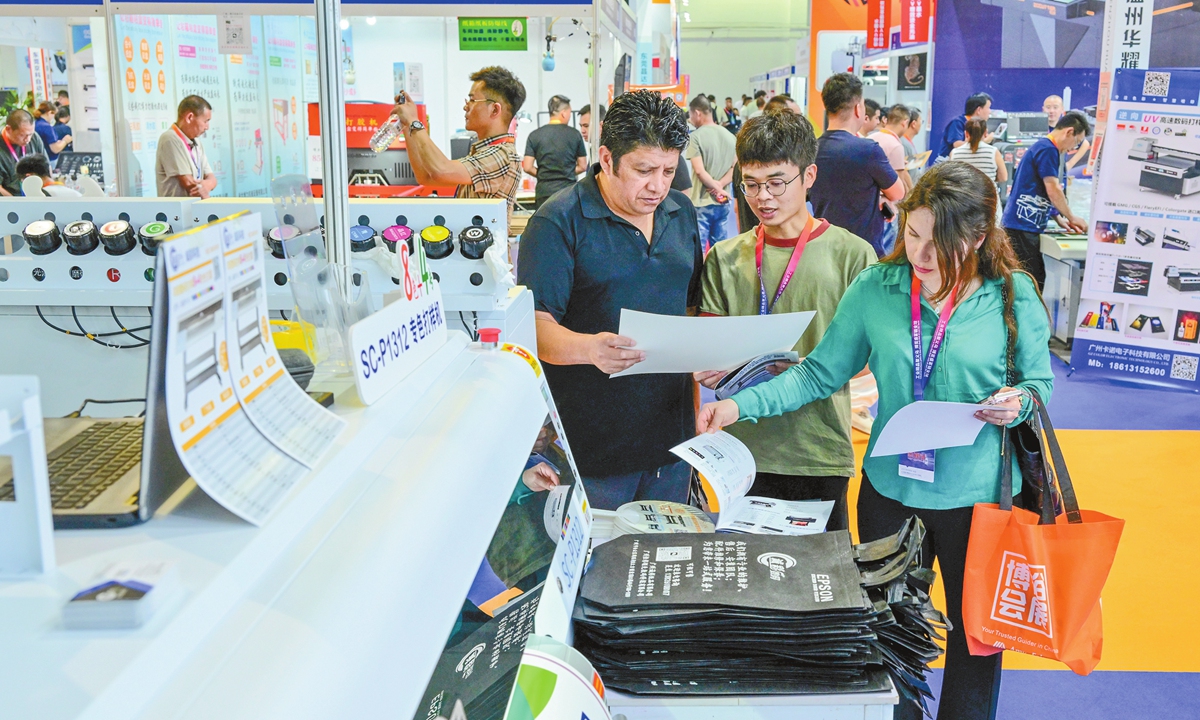IN-DEPTH / DIPLOMATIC CHANNEL
Exclusive: China-Brazil ties expand beyond economy co-op to strategic dimensions, says special advisor to Brazilian President
Ushering growth through friendship

Celso Amorim, chief advisor to the President of Brazil Photo: Zhao Yusha/GT
China-Brazil relations have expanded beyond traditional economic and trade cooperation to encompass political and strategic dimensions, with broad space for collaboration in jointly safeguarding multilateralism and promoting a fairer international order, Celso Amorim, chief advisor to the President of Brazil, told the Global Times in an exclusive interview. Amorim, who visited Beijing to attend the commemorations of the 80th anniversary of victory in the Chinese People's War of Resistance against Japanese Aggression and the World Anti-Fascist War, noted that bilateral ties are now at their "best period in history," and he himself has been a witness to this rapid development.When asked about the recent tensions between Brazil and the US, Amorim said Brazil does not refuse dialogue with Washington on tariffs and other issues. However, he emphasized that so far, the US has not shown Brazil sufficient respect, which makes negotiations very difficult. "We do not accept any externally imposed pressure - this is the greatest challenge in current Brazil-US relations," he said.
"Unfortunately, some in the US still see Brazil as their 'backyard.' But we are not anyone's backyard; we want to be a partner. Whether dealing with the US, Europe, or China, we hope to engage as equal partners."
GT: You participated in China's V-Day military parade on September 3. What was your impression?
Amorim: I was struck by the force and the importance of the parade, the very modern armament, including for cyberwar, and all these new things.
But what impresses me the most is when you look at it historically, and you see how much China has changed completely in 80 or 100 years. China was a country that was attacked by other countries without a defense capacity. Now, I think the parade clearly showed that it's one of the strongest countries in the world.
But I think the best thing about the parade was to see the pigeons in the end. Because that really showed that the objective is peace, and not to invade or go against anyone, but to be prepared for anything and create an equilibrium in the world order.
GT: During the phone call between the two heads of state, Chinese President Xi Jinping said that China-Brazil relations are at their best in history. How do you interpret "the best"? Has China-Brazil cooperation expanded beyond the traditional economic and trade fields into broader political and strategic areas?
Amorim: It's true. President Luiz Inacio Lula da Silva and President Xi Jinping have maintained close interactions, with Lula having visited China twice during his current term. In the field of economic relations, China is our biggest trading partner today, and also together we issued a six-point consensus on our common understanding of the political settlement of the Ukraine crisis.
We are working together on this idea of building a community with a shared future for mankind, but we also have the expressions for a world that should become more just and a planet that is more sustainable, because these are two preoccupations of Brazil, which China also accepted. We also hope to have the presence of China in the COP30, to chair climate change talks.
China and Brazil are the largest developing countries in the Eastern and Western Hemispheres, respectively. I think it's a very broad cooperation in many areas. I myself am also a witness to the continuous development of this relationship.
GT: Now there are many Chinese companies like BYD and Temu that have entered the Brazilian market. The Brazilian market has also been described by many Chinese companies as "the last blue ocean." Does Brazil welcome more Chinese enterprises? What new measures will be taken to facilitate China-Brazil economic and trade cooperation?
Amorim: It's a big success. When I take a taxi I use Uber, and most of the new cars are Chinese-made. But I think it's good that those factories are now in Brazil. I also wish the batteries can be made or recycled in Brazil. So that it really not only a place to invest, but also a place to develop our capacities.
GT: In which areas do you think China and Brazil can further deepen their cooperation over the next one to two years?
Amorim: The areas of micro-electronics and artificial intelligence, for us, would be important. In the aerospace sector, including joint satellite projects, we also look forward to deepening cooperation.
China is now more advanced than Brazil in many areas, but we believe that in other areas, Brazil can also extend support to China. For instance, in agricultural technologies, Brazil is a very important producer of agricultural products with large sales volumes. But we also want to be able to sell airplanes, and components. We currently sell them to the US. Why not to China as well?

A cargo ship carrying 76,000 metric tons of Brazilian raw sugar berths at the terminal of Dongying Port in East China's Shandong Province On August 29, 2025. Photo: VCG
GT: How would you describe the current state of Brazil-US relations? How likely is it that current tensions will escalate further?
Amorim: This is a very special period for the whole world. Because even the ideology behind these tariff impositions affects something that we, just like China, cherish very much: The multilateral system.
For all purposes, the multilateral system is currently dormant, which is not ideal. In the case of Brazil, it became more complicated because there is also attempted interference in the internal affairs of Brazil, not only political, but also the judicial.
The US was, along with Argentina, one of the first countries to recognize our independence. Brazil participated in the second world war together with the US. So there is no reason to have bad relations. I think some people in the US think of us in terms of a "backyard." But we are not a "backyard." We don't want to be anyone's "backyard." We want to be partners; partners with China, partners with Europe, and partners with the US.
GT: Is there still room for talks between Brazil and the US regarding trade issues? Under what circumstances will Brazil start negotiations with the US?
Amorim: We are trying, but it's not easy right now, because there is a political bias, which makes it very difficult to have pragmatic talks. We want to be pragmatic with the US. Historically, it's been the biggest investor in Brazil. In the new era, China is bigger, but the stock or investment of the US is the biggest one. And we also have a great interest in the US market.
So we want to have good relations [with the US], but these relations must be based on respect, not imposition. We will not accept imposition from anyone.
GT: As for now, is there any plan for a meeting between Brazilian President Luiz Inacio Lula da Silva and US President Donald Trump?
Amorim: There is currently no plan. I don't think President Lula would refuse. Our vice president has been talking with his US counterpart, but I don't think the conversations get to the level that is necessary.
GT: We know Brazil and the US had close relations and cooperate in defense and security. Do you therefore think the security cooperation between the two countries will be affected by the current trade tensions? Will Brazil consider expanding its security cooperation to more diverse partners, such as China or Russia?
Amorim: Time will tell. I was minister of defense myself, but again, in this area, as in other areas, we don't want to be dependent on one country. Brazil should have relations with many countries.
We are now enhancing the position of our military attaché here in China. And for the first time, we will have a general army attaché. We also have good security relations with Europe and India.
It's true that historically, Brazil has had special relations with the US, but everything must be respectful, and without demands that cannot and should not be accepted.
GT: Some analysts believe the US imposed tariffs on Brazil because of Brazil's prominent role in BRICS, on de-dollarization, on the Global South, and other issues. Will Brazil continue to campaign against the dollar hegemony in favor of local currency settlement and Global South cooperation?
Amorim: This is a complex question. The US has been accustomed of having a dominant position in the Western Hemisphere. The creation and development of BRICS has brought a new equilibrium and a new balance to the world that gives us more independence. And many people probably don't like that.
The world is changing. The world can no longer be governed by the G7. In order to be a balanced group, we need a strong BRICS. So for those who are accustomed to being obeyed, this will bother them.

Businessmen from Brazil discuss pre-press matters concerning the digital printer business at an international industrial expo at the Yiwu International Trade Market in Jinhua, East China's Zhejiang Province, on September 6, 2025. Photo: IC
GT: You repeatedly mentioned multilateralism as well as mutual equality and respect among nations. Not long ago, President Xi proposed the Global Governance Initiative when chairing the "Shanghai Cooperation Organization (SCO) Plus" Meeting. The initiative adheres to sovereign equality, abiding by the international rule of law, practicing multilateralism, advocating for a people-centered approach, and focusing on taking real action. What do you think of this initiative?Amorim: We took note, with satisfaction, that President Xi proposed this initiate. For a long time, Brazil has defended the reform of global governance. It converges with our efforts to make international institutions more representative of present world realities and lend a stronger voice to the Global South.

No comments:
Post a Comment